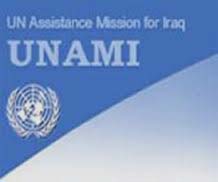UNAMI Half Yearly Report on Human Rights – January to June 2013
The United Nations Assistance Mission for Iraq and the Office of the High Commissioner for Human Rights release d the Half Yearly Report on Human Rights, covering the period from January to June 2013.
d the Half Yearly Report on Human Rights, covering the period from January to June 2013.
Extract from the report (PDF file) by Iran Interlink:
[…]
11.1 Camp New Iraq (Camp Ashraf)/ Camp Hurriya (Camp Liberty)
In accordance with the memorandum of understanding signed with the Government of Iraq in December 2011, UNAMI continued to conduct daily monitoring visits to Camp Hurriya, where more than 3,000 members of the People’s Mujahedin Organization of Iran/Mujahedin-e-Khalq (PMOI/MeK) – an organisation formally listed by a number of States as a terrorist organisation – are currently based.
On 9 February and 15 June Camp Hurriya was subjected to rocket attacks. In the first attack, eight residents were killed and, according to staff at the Government-run clinic in the Camp, a further 71 were injured. As a result of the second incident, two residents lost their lives. The SRSG publicly condemned both attacks and called on the Government of Iraq to take appropriate measures to ensure the protection and safety of the residents. In the aftermath of the February attack the residents’ leadership demanded, inter alia, to return to Camp Ashraf and that they be provided with large T walls for all accommodation blocs and amenities (totalling some 17,000 large T walls), personal protective equipment (PPE) for each resident, and 380 bunkers in addition to the 120 already present in the camp. By the end of the reporting period, the Government of Iraq had provided 296 bunkers and 591 small T-walls but had refused the residents’ leaders request for a return to Camp Ashraf, for personal protective equipment and for large T walls.
UNHCR has continued to work towards identifying individuals in need of international protection and durable solutions for the residents of Camp Hurriya. As of 30 June 2013, 1,604 individuals had been identified as requiring international protection. However, UNHCR’s efforts to find durable solutions for the residents have been hindered by the non-cooperation of residents, such as the boycotting of UNHCR interviews. In March, the Government of Albania offered to accept up to 210 residents for resettlement.
However, the PMOI/MeK refused the names accepted by the Government of Albania, and insisted that it should decide who should be resettled there. As a result by the end of June, UNHCR had facilitated the resettlement of 71 residents only. Similarly, in April the Government of Germany decided to accept up to 100 residents for resettlement. At the time of writing, preparations were underway to relocate the first group some time in July.
UNAMI has continuing concerns about human rights abuses committed by the PMOI/MeK leadership within Camp Hurriya against the residents. These claims have been made to United Nations Monitors during interviews with residents who had managed to leave Camp Hurriya, as well as in a number of private discussions with residents who still reside in the Camp – despite the leadership’s attempts to prevent such discussions. The PMOI/MeK, which has a hierarchical and authoritarian structure, imposes a number of severe restrictions on the residents’ rights, including the right of freedom of movement within the Camp and the right to leave the organization, the free right of association, along with restrictions on contacts with family members (including those residing in Camp Hurriya), on access to basic communications, and on access to medical care and treatment.
[…]

